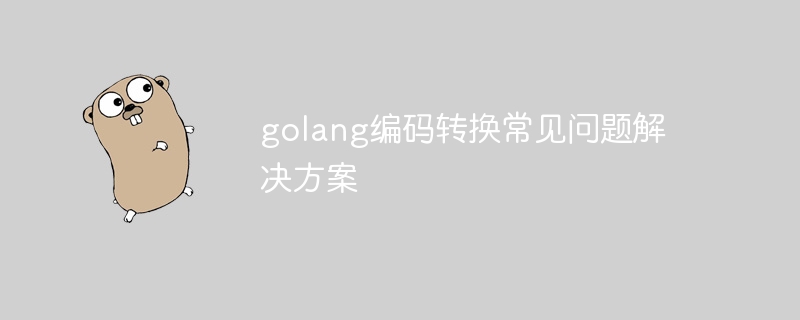Home >Backend Development >Golang >Solutions to common problems with golang encoding conversion
Solutions to common problems with golang encoding conversion
- 王林Original
- 2024-02-20 18:12:04815browse

When programming in Golang, we often encounter encoding conversion problems. Especially when dealing with file reading and writing, network transmission and other scenarios, conversion between different encodings may cause some confusion and errors. This article will focus on common problems with encoding conversion in Golang and provide solutions and specific code examples.
1. Conversion between UTF-8 and other encodings
Problem description:
When processing text data, it is often necessary to convert UTF-8 encoding to other common encodings encoding, or convert other encodings to UTF-8 encoding.
Solution:
The Golang standard library provides the golang.org/x/text package for encoding conversion. The following is an example of converting UTF-8 encoding to GBK encoding:
package main
import (
"golang.org/x/text/encoding/simplifiedchinese"
"golang.org/x/text/transform"
"io/ioutil"
"os"
)
func utf8ToGBK(utf8str string) (string, error) {
h := simplifiedchinese.GBK.NewEncoder()
out, _, err := transform.String(h, utf8str)
if err != nil {
return "", err
}
return out, nil
}
func main() {
utf8str := "你好,世界"
gbkstr, err := utf8ToGBK(utf8str)
if err != nil {
panic(err)
}
println(gbkstr)
} In the above example, we use the golang.org/x/text/encoding/simplifiedchinese package to achieve Function to convert UTF-8 encoding to GBK encoding.
2. Determination and conversion of file encoding
Problem description:
Sometimes we need to determine the encoding format of a file and convert it to the specified encoding format for processing .
Solution:
You can use the mahonia package to convert and determine file encoding. The following is an example of converting the file content from GB2312 encoding to UTF-8 encoding:
package main
import (
"github.com/axgle/mahonia"
"io/ioutil"
)
func convertEncoding(filename, toEncoding string) error {
content, err := ioutil.ReadFile(filename)
if err != nil {
return err
}
dec := mahonia.NewDecoder("gb2312")
utf8Str := dec.ConvertString(string(content))
err = ioutil.WriteFile(filename, []byte(utf8Str), 0666)
if err != nil {
return err
}
return nil
}
func main() {
filename := "test.txt"
err := convertEncoding(filename, "utf-8")
if err != nil {
panic(err)
}
}In the above example, we use the mahonia package to convert the file content from GB2312 encoding to UTF- 8 encoding and rewrite the converted content into the file.
Summary
The operation of encoding conversion in Golang is relatively simple. By using the packages provided by the standard library or third-party libraries, we can easily achieve conversion between multiple encodings. When dealing with file encoding, attention needs to be paid to reading and writing files to ensure data integrity and accuracy. I hope this article will be helpful to everyone in Golang encoding conversion!
The above is the detailed content of Solutions to common problems with golang encoding conversion. For more information, please follow other related articles on the PHP Chinese website!

